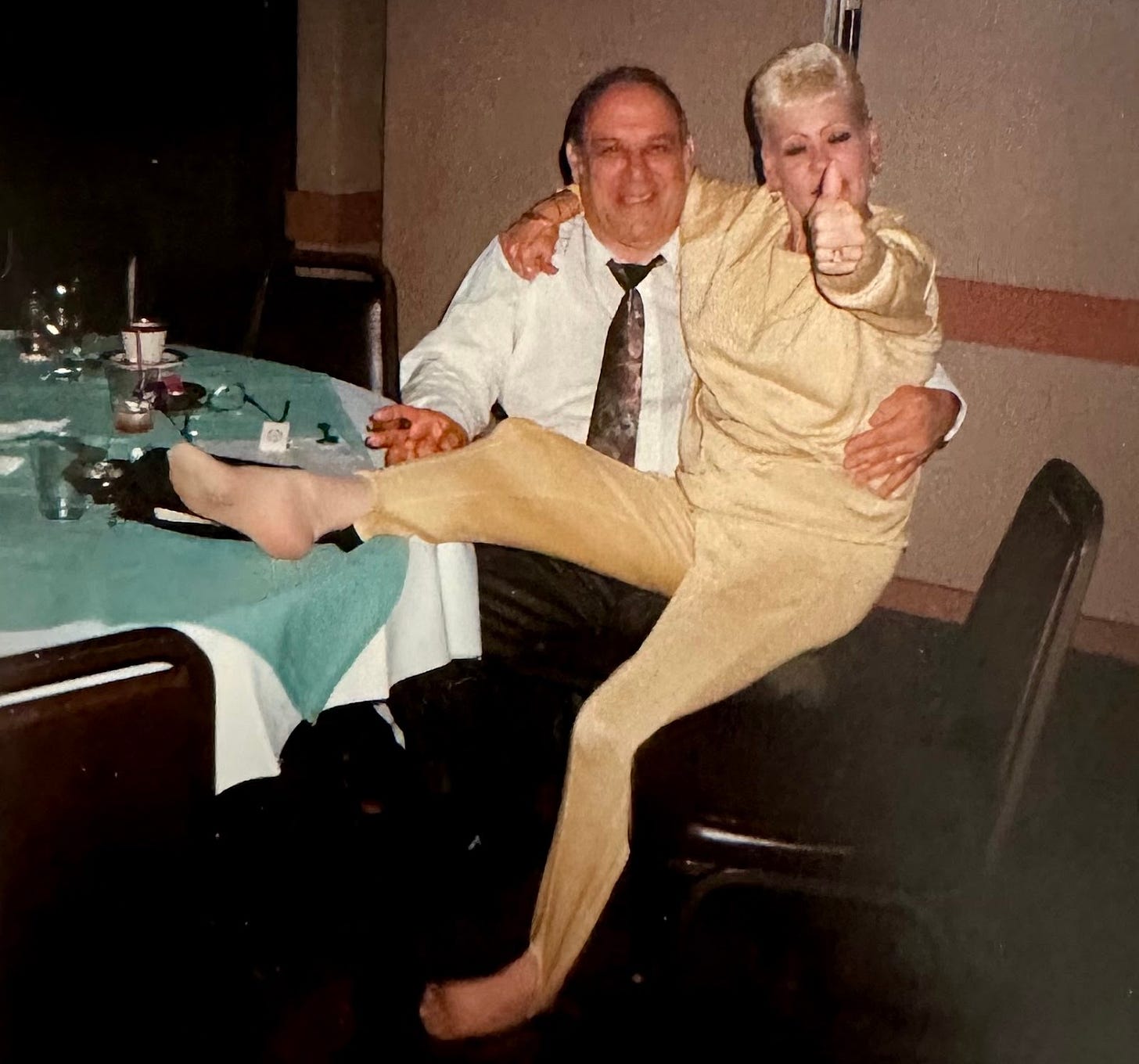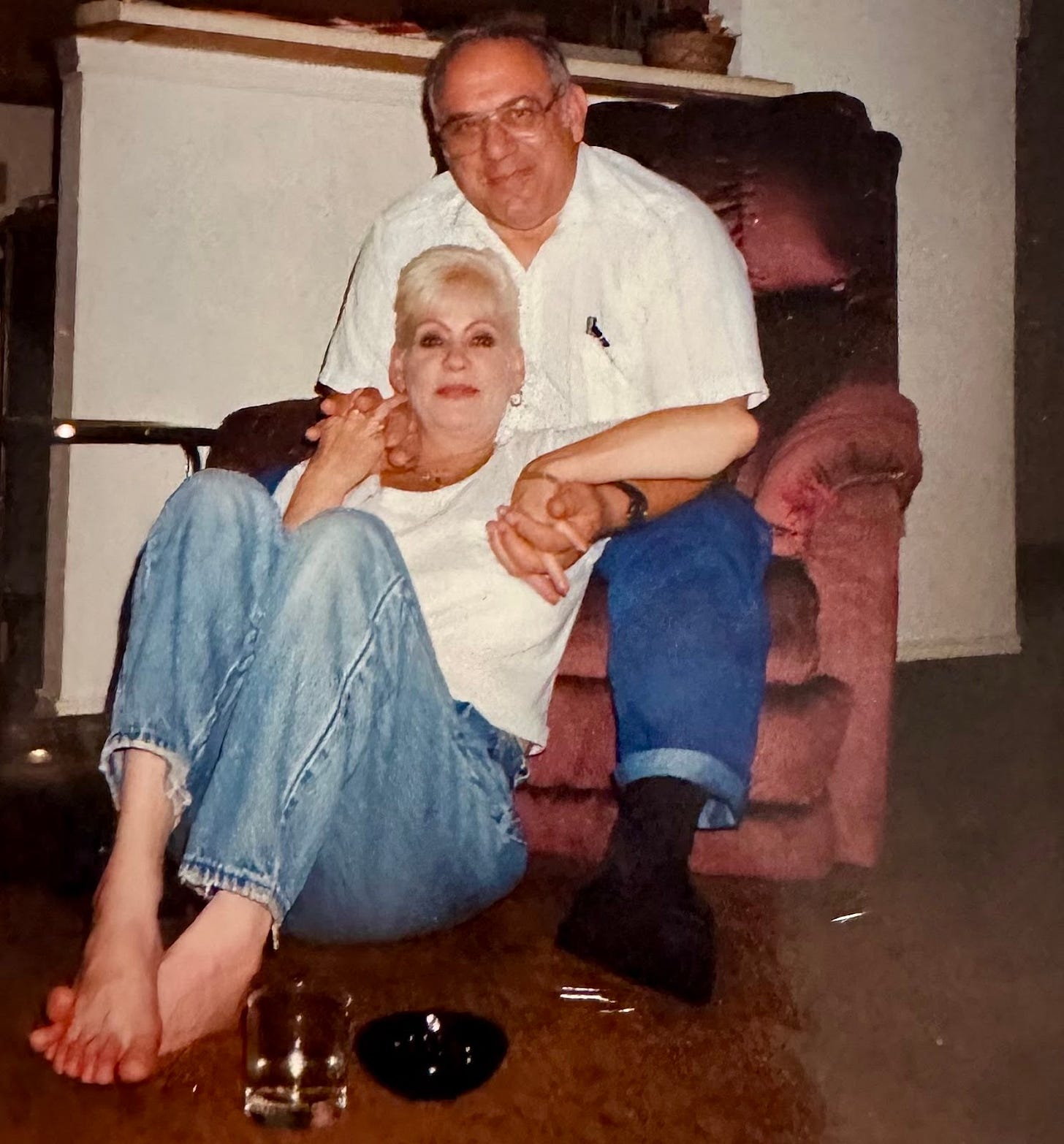A Voicemail from Art
Reflections on Care, Commitment, and Family Bonds
My stepdad, Art, left me a voicemail a few months ago. His gruff Bronx accent boomed through my phone’s speaker. “Robin. Call me if you can.” He doesn’t often leave messages, so I returned his call as soon as I could.
Art picked up and launched into a series of questions about the podcasts I host and produce. He’s got just enough access to Facebook to be dangerous. By that, I mean he sees all my social media posts and thinks I’m way more accomplished than I am.
“Robin. Listen. I’m in this place...”
He meant a nursing home or rehab facility. I’m not sure which one he was in at this exact moment. He’s been in and out of both facilities over the last few years, fighting CHF and dreaded old age.
“Somebody’s gotta tell people about how bad these places are. You gotta tell everyone what kind of place kids are putting their parents in. You are the only person who can do it.”
I gulped because, um, I am not an investigative journalist. I don’t even visit the ballpark of this kind of writing. Also, many really qualified folks can do this, and probably already have done this better than I could think of. But I owe Art. He is the guy who met my mom when she was not at her best, married her, treated her like a queen, and continued to do so until the day she died.
Art and my mom, Rosie, met at one of those American Legion or VFW-type places. My mom was, of course, dressed in a sequined skirt or pantsuit that she called “classy.” They hit it off. Art proposed two weeks later, moved in with Rosie two weeks after that, and married her two months after that.
There were ups in their marriage, but many more downs. My mom was getting more irrational due to a lifetime of lack of self-care and increased drinking. She was unhappy and started demanding life changes that anyone could see were not great ideas. She forced Art to sell his family home. Then, she made him sell their belongings so they could buy an RV and drive around the country. Spoiler alert: they did not drive around the country. Instead, they drove to Art’s best friend’s house and lived in the RV in his driveway. In another spur-of-the-minute decision, she told Art to “Sell this goddamn RV right now or I’m leaving you. I can’t live like this.” Art acquiesced. He handed the keys to an RV salesman and walked off the lot, shouting over his shoulder, “You keep it. I’m done paying for it.” After the RV, there was a move to Virginia, followed by a move back to Texas. Throughout all of this, Art never wavered. He could have, perhaps should have, left her multiple times, but when Art said he was doing something, he could not be deterred.
Somewhere along that crazy path, my mom was diagnosed with emphysema, and she slipped into a period of abusing prescription pills. Her health declined to such a state that when Art called, I was afraid he was going to tell me that she had died.
When they were back in Texas, my sister and I organized an intervention for my mom. Art joined us, and we tried to get her to see that if she wanted to stick around, she would need some help. It didn’t go well. She was cold, closed off, and uninterested in changing. One of the moments I remember most clearly was when she said, “If I’m going to do this, some things will have to change around here. Like maybe things can’t stay the same.” She looked at Art as she said this. My sister and I both knew what she meant– their marriage may not make it. I didn’t think Art understood what she was saying at the time. He could be very aloof when he wanted to be, which helped him stay married to someone like Rosie for 13 years. That’s when he said in his booming voice, while leaning back in his La-Z-Boy, “You know Rosie, if things are gonna have to change, then they’re gonna have to change.”
He understood that he might have to let her go to help her get better. I’ve looked back at that moment many times and thought how grossly I underestimated his understanding of what was happening around him. Ultimately, Rosie wasn’t able to recover. It was something that was beyond her in this lifetime.
Art stood by her until the very end of her life, though. He supported her. He loved her. He treated her like the queen that she did not believe herself to be. Now, I don’t want to turn him into a saint. Art has always done exactly what he wanted to do. He’s stubborn, let’s just say a little behind on some social issues, and not often interested in the nuance of a debate. But he’s continued to be a part of my life and my kid’s life for nearly 20 years since my mom died. He calls my kids his grandchildren. He’s never asked for anything from me other than for us to keep in touch, so of course we did.
When he called me a couple of months back about telling this story about elder care, I knew I had to figure out how to do it because I would forever be grateful for all he did for my mom. I looked for a way into the story using a format I could write from. An idea began to form in my brain–I’ll put this story in Art’s own words and record an interview, getting his thoughts on what kids and families need to think about when putting their parents in care. There are a million stories out there with experts talking about the insurance side of the healthcare system or the financial side of things, but we don’t often hear from the people in care themselves. Maybe it’s because there are too many factors happening by the time folks get into care, such as they’re battling dementia, Alzheimers, or their body's breaking down to a point where they aren’t able to articulate their story.
I wanted to move quickly on this. Art’s a battle ax, and he doesn’t let much slow him down, but lately, his body has had other ideas. So, I recruited my sister to bring a laptop and headphones so I could capture his audio and interview him in order to share the story from his point of view. The goal: Art is happy, and (if I can pull it off) the story is a thought starter for anyone considering putting their parents in care.
We scheduled the recording for a few weeks after our initial call. The day we were set to meet up, he texted to say that he wasn’t up to it. He got another infection, his speech was slurred, and he wasn’t feeling himself. Over text, we attempted to schedule the record date one more time, but he stopped responding. That’s when we heard from one of his daughters that he had been moved from the home to the ICU. He battled his way out of ICU, but within a few days, he was transferred to hospice.
Art passed away peacefully on Sunday, June 23rd.
Grief is a tricky thing. I find myself processing the loss of Art but also working not to change the relationship we had because he is gone. In the past, I’ve wondered if my mom and Art’s relationship enabled her to decline further. But the more I think about it, the more I realize that my mom clung to him like a life raft. In a lot of ways, they were each ports in storms for the other.
I will forever be thankful to Art for the love he bestowed on my mom and for taking care of her through those dark years so my sister and I didn’t have to uproot our lives in an attempt to help someone who wasn’t interested in help. He allowed her to die with dignity, and he continued to love me, my sister, and our families in a way that was very Art–loud, opinionated, and always there.
I love you, Art, and I hope you’re wherever we all go, rabble-rousing and repeating all the stories about days flying helicopters back in the military.
So we didn’t get to do the story that Art wanted me to tell, but perhaps this is a better one. For those of you who are contemplating putting loved ones into care, I’m sorry that I don’t have Art’s words of wisdom to share with you, but if you could take a few extra moments to research and check in on your choices of care, I know he’d appreciate it.
Everyone deserves to be treated the way that Art treated Rosie.





Robin, thank you for loving my dad the way you did. I know he loved your mom, you, and your sister very much.
Art Jr.
I did not know Art, but I do know what it is like to have someone unexpected come into your life and love your mom and help share the burden — and be there no matter what happens. These people are true blessings and even if you couldn’t share Art’s advice, you shared beautifully the essence of what he meant to you. I am sorry for your loss.